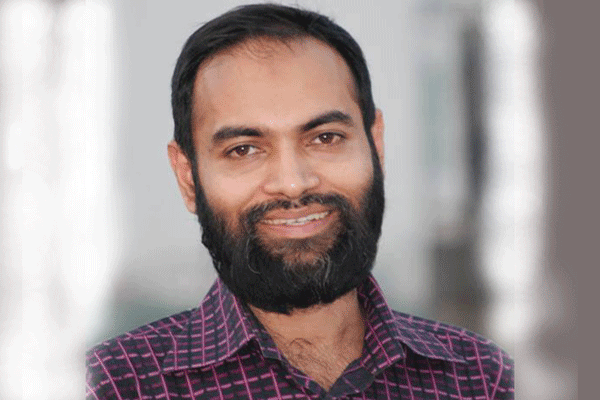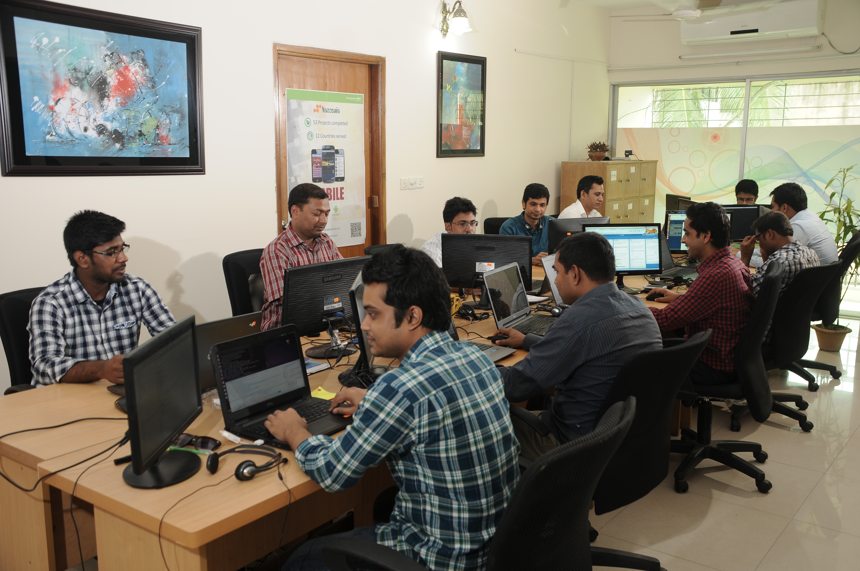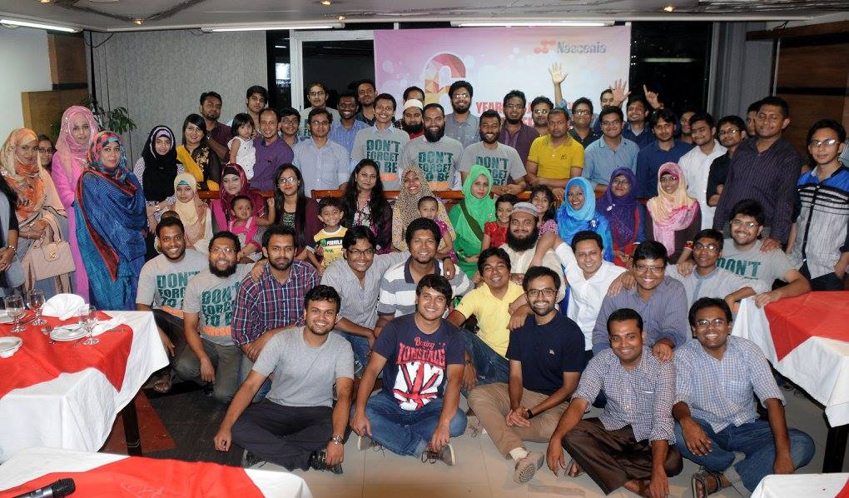
Shaer Hassan is the founder and CEO of Nascenia, a software solutions provider based in Dhaka. Started seven years ago, today Nascenia serves clients from a long list of countries, has a growing business and eyeing the next phase of expansion.
That said, Nascenia has seen its share of struggles and challenges. The most recent episode happened in 2014 when it lost one of its major clients. Since then the company has been working hard on a diversification strategy. It has launched two independent products, a women-focused eCommerce site and a matrimonial matchmaking site for the Bangladesh market and put in motion an active strategy to diversify its portfolio.
Shaer is an original thinker. He is one of the less intimidating persons you would ever meet. A reticent person in nature, Shaer instantly puts everyone around him at ease. He speaks slowly but confidently lingering in his thoughts as if every time he has something more to add.
In this interview, Shaer Hassan illustrates how Nascenia approaching its next phase of growth, its global expansion plans and independent product strategy to how transparency and shared autonomy defines its internal culture and why finding right people remains a key challenge for his company and shares his ambition for Nascenia over the next few years and reflects on his management philosophy and why our deeper meaning and greater satisfactions come from building something meaningful, performing daily grind and working our heart out.
While the interview offers a rare window into the inner workings of one of the fast-growing and award-winning technology companies in the country, it is an equally insightful and transcendent account of human endeavor and experience of building a business from scratch.
Future Startup
You started Nascenia seven years ago along with your two other co-founders. How much has Nascenia evolved over the past few years?
Shaer Hassan
Any great business is about great people. Your team defines how far and wide you would go. While we have made significant progress in a host of areas, the one I’m most proud of is our team.
Over the past years, we have been able to put together a great team. We have now a batch of strong middle managers, who, I believe, will lead our next phase of growth. The focus for us now is to reduce the founders' dependency. The goal is to go from a founder-led company to one led by employees. We are looking to create leaderships who can lead the business.
The number of people has also grown. We are now a team of over 70 members.
At the same time, we have developed systems and structure to ensure effective management of our growing team. There are more works to be done but we are in a better shape now than any time before.
Needless to say, a strong middle management is imperative to this transformation. We have been working on it and have succeeded in building a strong senior management team, to a certain extent. That’s one major progress.
Another major change has taken place in strategy. We have started focusing heavily on diversification. In 2014, our revenue took a hit when we lost one of our major clients. It affected our growth significantly in 2014. Although we managed to maintain our team and recover eventually, we had to struggle for a while. We took lessons from that experience. Diversification is now one of the major strategic priorities for us so that we could avoid such disruptions in the future.
As part of the strategy, we have been working on a couple of products for the local market. Goponjinish.com, our women-focused eCommerce platform, is doing well. We launched it as a separate product within Nascenia. Today it runs independently, has separate space and is self-reliant and can pay its own bills.
Another one is biyeta.com, an online matchmaking platform for Bangladesh market. We have been working on it for over a year now. While we don’t have any noteworthy initiative in this space yet, online dating and matchmaking sites have seen growing popularity in many countries in the world. Our neighboring country India has multiple successful initiatives in this space such as shaadi.com, which has received significant attention in the recent years. In fact, many non-resident Bangladeshis are using these Indian platforms! Biyeta is our attempt to add a modern vibe to our hackneyed arrange marriage system in Bangladesh.
Our society is going through a transformation. We are seeing an unprecedented growth in urban population. Our socio-economic condition is also changing rapidly while social connections are on the decline. But a large part of the community still prefers arranged marriage who often struggle to find suitable bride or groom. We believe this is a big and complex problem and has true potentials in Bangladesh.
When we started Biyeta.com, there was no great platform in the space. There are some players but we think much more can be done in the space.
Biyeta.com is a relatively easy-to-use and user-friendly platform where we emphasized on two things: privacy and trust. We have placed process and system in work in order to ensure the privacy of our users.
In simple, people use Biyeta.com to establish contact with each other through using our platform. We don’t go beyond that. But our ambition is higher. Our goal is to mitigate problems people face when it comes to arranged marriage and make arranged marriages happen.
Biyeta.com now has over 26000 accounts and 10,000 active users and is growing daily. The number of users is not a challenge for us but ensuring that they are serious and responsive is a challenge.
Biyeta.com works in a very simple way. You can send an invitation to anyone you want to for free. You can see basic information in this phase but if you want to go to the next stage of knowing more about the person and contacting him or her, after getting the permission, you need to make a payment of Tk. 100. There is a wallet in the system, you need to put money into the wallet. This has a money back guarantee. If the other person doesn’t accept the invitation and does not allow you to see the details, we return your money in a week.
The platform is now mostly barebone but we adding new features and improving daily. We are also doing some very advanced things based on machine learning and face recognition so that we can meet more needs of our users and improve their experience. We've also launched an Android app for existing users. We’re now working to open it up to everyone.
This is a complex and expensive project in nature. It currently operates under overall Nascenia management and a small team is working on it. But we plan to make it an independent entity in the near future.
[su_divider top="no" divider_color="#adacab" link_color="#edde29" size="1"][/su_divider]
A Message From Dhaka Bank Limited

INTRODUCING DHAKA BANK GO - LET THE BANK MATCH YOUR DAILY SCHEDULE
Dhaka Bank Go gives you secure access to your Dhaka Bank Accounts and Credit Cards and other exciting facilities from your mobile devices anytime, anywhere. Explore and enjoy the infinite opportunities. Learn more here.
[su_divider top="no" divider_color="#adacab" link_color="#edde29" size="1"][/su_divider]
Over the past years, we have been able to put together a great team. We have now a batch of strong middle managers, who, I believe, will lead our next phase of growth. The focus for us now is to reduce the founders' dependency. The goal is to go from a founder-led company to one led by employees. We are looking to create leaderships who can lead the business.
Future Startup
Any other noteworthy progress?
Shaer Hassan
We’re working on a readymade garments related product. A B2B platform to be more precise. We’ve already discussed with a potential investor and a partner. If everything falls in place, we hope to launch it soon.
Getting into partnerships has strategic importance to us. It helps to distribute the risk as well as increase the chance of the success of the business.
Future Startup
Currently, your main focus is the international market. But there is a growing concern about the future of outsourcing work. Many people fear that the opportunity might shrink in the near future and many tech firms are eyeing local market with renewed importance. Do you have any plan for Bangladesh market?
Shaer Hassan
We’re not that much active in local market yet which precisely means we don’t actively seek work in the local market. But that does not mean we don’t do local work. We do when someone approaches us and we find the collaboration compatible.
There is a big difference between Bangladesh market and international market, in terms of maturity and expectation which requires us to offer different solutions to each market which is a difficult job that often discourages us from actively pursuing work in the local market. Now when a Bangladeshi company wants a solution at the international standard then we work with them. Recently, we've worked with International Finance Corporation (IFC) and Robi among others.
There are other challenges as well. It is quite straight forward to work with foreign clients. It does not take more than 3-5 emails and skype conversations to start a project. We assignment team and start designing and building the product on the 8th day from the day of order placement. Within a month, we deploy it and upload the progress on our servers. We usually finish a project within 5 to 6 months. Usually, we get paid on monthly basis and payment is very quick.
On the other hand, in Bangladesh, the process is painfully lengthy at times. It takes multiple meetings and months just to start a project. Then you need to take approvals at every level which is time-consuming and expensive. Any delay is costly because we get to pay people and maintain other expenses. Consequently, we end up spending a lot of money but not getting the desired product. This is quite opposite in the case of foreign clients.
That said, hopefully, things are changing now. There are companies doing great works in the local market. Similarly, our local market is also maturing. We want to work with local partners who are interested in getting great technology solutions and service, and willing to cooperate smartly.
Future Startup
How many clients do you serve in a regular month?
Shaer Hassan
There are fixed and long-term projects and short-term projects. Right now we’re working with around 15 clients from UK, USA, Canada, Japan, South America, Middle East and a few other countries. Our growth slowed down since 2016. We’re growing at a rate of 10-15% yearly now.
We’ve consciously decided to diversify our risk. Apart from investing in our own products, which is a rather long-term strategy, we have also diversified our revenue sources.

Future Startup
From a strategic point of view, developing your own product is a clear departure from your current position as a technology service provider. How do you see it and how do you accommodate the both?
Shaer Hassan
Every company wants to become a product company. That’s an ambition very natural to have but a difficult one to achieve. Making a product succeed requires a lot of things starting from expertise to investment and luck.
We’ve launched two products over the past years, as I mentioned earlier. Both are at the very early stage. Going forward, we have plans to explore a few other areas.
One key aspect here is diversification. Having more than one bucket to rely on seems always a good strategy to me.
That said, while we are working on our in-house products, we will continue working with our international clients because it not only brings us revenue it also helps us maintain the expertise edge in terms of technological capacity. It helps us to learn global trends. Software companies should work in the international market to challenge themselves all the time.
Future Startup
Business is all about uncertainty. As you mentioned earlier that your company had to suffer from losing one of your major clients in 2014. How do you manage this type of uncertainties now?
Shaer Hassan
We have applied some strategies to deal with such challenges. When your company becomes over-reliant on a few clients or country or sector, it becomes hard to manage when one of them leaves.
This is a critical challenge for many companies. But when you properly diversify and distribute your revenue streams then it’s easier to manage.
We’ve consciously decided to diversify our risk. Apart from investing in our own products, which is a rather long-term strategy, we have also diversified our revenue sources.
We now have clients from many countries in the world. Our portfolio is geographically well distributed. Same is true for our clients. We actively seek to maintain a balance of our dependency on our clients. Our portfolio is also well distributed in terms of value. We plan to explore more options in the near future.
Future Startup
What are challenges for Nascenia now? When you started seven years ago, challenges were different, but now that you are a mature as well as growing company your challenges must be different.
Shaer Hassan
Human resource is one of the key challenges for us now. Over the years, Nascenia has experienced an increased brand recognition and now many freshers and young people want to work with us, which is a good thing. Even a few years ago we faced challenges with attracting talents.
The current challenge is different in nature. We struggling with finding mid-level managers. It’s often hard to find people who are capable, have professional experience and the right attitude and are willing to work with us.
Entrepreneurs are everything in the early days of a company but when you are growing, founders can do only so much. You need a team and your employees need to take charge. It is relatively easy to start a company but making it sustainable is the harder part.
This is not an isolated problem. We are seeing a consistent decline in the quality of our graduates. We come across students from renowned universities with good credentials who lack basic skills. Commitment and sense of responsibility, good attitude, hard working mentality - these things are increasingly becoming rare these days.
Another challenge is investment. We never took external investment so far and have no plan to do so. However, with investment, it would be relatively easier for us to do more innovative works. Now we earn and invest into the company which often slows us down.
On the other hand, we could have avail more strategic support from the regulators. Our government is doing a lot of things for the technology industry but they are spending more money than it is needed in areas where the impact is minimal. Government should focus on easing up regulations, red tapes and get out of way of businesses.
We are seeing a consistent decline in the quality of our graduates. We come across students from renowned universities with good credentials who lack basic skills. Commitment and sense of responsibility, good attitude, hard working mentality - these things are increasingly becoming rare these days.

Future Startup
How do people work at Nascenia? Can you please tell us about the culture at Nascenia?
Shaer Hassan
We have developed systems over the years that assist us to work effectively as a team. We have office hours that everyone in the team maintains. That said, we are quite flexible.
We encourage and reward people who take initiative. We have developed a quarterly incentivization system based on a set of parameters such as how much time one employee is spending at work, how much they are contributing to the total revenue and other goals along with their regular works etc. These parameters help us to understand how much value a person is adding to the company from several perspectives. Based on this, we provide bonus and incentives. The entire process is transparent. Anyone can see their progress and contribution level.
Team members often rank each other. Through this way, we can monitor and motivate all the employees.
Transparency is key to our culture and how we operate as a company.
We encourage and reward people who take initiative
Future startup
What are the plans for Nascenia going forward?
Shaer Hassan
Some of the things I have already mentioned. Apart from that, we are seriously looking at expansion. We are working on different strategies such as hiring agent or opening up representations in different countries.
Building a direct connection with your customers is highly important in service business if you want to expand. Customers also sometimes want to deal with someone they know or from their own country. It gives confidence to customers.
We have been trying agency model. Our experience with the strategy is rather mixed. Some of the collaborations in the past worked, others did not.
Our lesson here is that in order to succeed you have to experiment a lot which requires investment. We are actively exploring different options now.
Recently, we went to Japan which we have found very interesting as a market. There are opportunities to explore in Japan. We are looking into options like the joint venture or opening up a local representative office in Japan.
Future Startup
How do you approach marketing? How do you reach out to your customers?
Shaer Hassan
B2B marketing is quite tricky. For us, most of it is still unpredictable. More so, because we largely deal with international clients. Currently, we use internet to attract interested clients.
We attend fairs and matchmaking events that also help generate leads. The most effective source of clients for us is the reference from existing clients, friends and former colleagues. Over 30% clients come from reference and networking. In most cases, they become long terms clients.
We are a medium sized growing company but we have room for growth. While we are continuously putting an effort in sales and marketing in different ways, we are yet to devise a predictable strategy. But that is a challenge, I believe, every other Bangladeshi IT companies share.
Future Startup
Growth is a challenge for almost every startup. Navigating the early days are hardest. You have been in business for seven years now, a feat very few startups manage to achieve. What does it take to grow a business from point A to point B?
Shaer Hassan
It requires everything that you have got to build a business from scratch. Of all dedication is the most important thing.
Three of us started Nascenia together seven years ago and this is everything we have been doing all these years. We have literally put every hour and every ounce of our energy into building this business. We don’t have any other concern and never had which has materially helped us throughout the journey.
We went through tough times but we managed to survive those days. Another thing that helped us to weather hard times is transparency.
We have been able to establish a transparent relationship among co-founders from the very beginning and a transparent culture in the company. Even when a co-founder earns from outside sources, they willingly contribute their earning to the company. This has cemented our relationship.
In the early days of your business, it is all about founders. You do everything if your founding team is strong and diverse, it helps.
Our founding team is really diverse which has significantly helped us in growing the business. I’m from a business background with little knowledge in IT. The other two founders are from the engineering background but they also have some knowledge in business and strategic planning. As a result, we complemented each other.
Now that we are turning into a mature company, our focus is the team. When your business is growing, team is the most important element. From the very early days, we tried to have the best people and give them the opportunity to learn and develop which ultimately has helped us to build a strong culture.
People often mistake capital as the most critical resource and allocate significant resource to manage it. Capital, more often than not, is an abundant resource. What is more important than capital is your people.
It requires everything that you have got to build a business from scratch. Of all dedication is the most important thing. Three of us started Nascenia together seven years ago and this is everything we have been doing all these years. We have literally put every hour and every ounce of our energy into building this business. We don’t have any other concern and never had which has materially helped us throughout the journey.

Future Startup
What is your management philosophy?
Shaer Hassan
I am not sure you can call it a philosophy but this is how I personally operate.
My management style, which often changes when I find something better, is driven by mentorship. I always try to inspire my team members to work harder. In fact, I try to push them to go beyond their boundaries. I, of course, guide them but I ultimately make them do the work.
For instance, when someone brings something to me, I patiently give feedback and undergo a few iterations of that until he/she perfects it.
I had an art teacher when I was in fifth grade. He used to give us assignments of going to nature and drawing things. During holidays he would make us draw an entire booklet and create sculptures from clay. But during his entire tenure, he hardly drew anything for us as a demo.
At times, we doubted his ability as an artist. Now that I reflect, I can connect the dots. He tried to awake the inner artist in us and help us realize our capacity to imagine and draw.
Instead of showing us how to draw, he tried to teach us much more important things. He taught us to imagine and to have confidence in our instinct. When people come to believe in their abilities, they can make impossible happen.
Entrepreneurship is not a glamorous profession. It is often boring, monotonous and hard. It is incredibly demanding a job and all-consuming. So if you are looking for something glamorous and fun, you better think twice. That said, building something from scratch, performing daily grind and working your heart out often delivers a rare kind of satisfaction that you would not find anywhere else. This satisfaction is not always in terms of money but in terms of other values since you get the rare opportunity to solve problems, do something new and innovative every day.
Future Startup
Entrepreneurship is a difficult journey. We are now seeing a growing file of literature around the psychological cost of the profession. Most entrepreneurs go through a kind of mental roller-coaster. Do you feel down? How do you pull yourself up when you feel down?
Shaer Hassan
Hard times come and that is normal. There are times when things don’t follow your expectation. There are things that are beyond our control. When I’m down, I try to contain it within myself and not allow it to affect my work and co-workers. I also share with and seek assistance from my family members and co-founders. I pray. I try not to get discouraged.
Action is the most effective antidote to every challenge and obstacle. That said, you might not feel like working at times. I try to be patient and continue working regardless of my mode. Perseverance is the most important yet often underrated quality in entrepreneurship.
Future Startup
You have years of experience in building a business from scratch. Prior to that, you worked at companies like GP and other. What are the biggest lessons from all those years?
Shaer Hassan
Building a business is a transformational experience. The most important thing that has happened over the past seven years for me is not revenue or the size of our balance sheet or network, but my self-transformation. Like the saying when we make something good it ends up making us.
This journey has changed me in more ways than anything else. It is not only me, my entire founding team has grown up and transformed themselves during these years.
Be open to new experiences and changes and allow demands of your journey to shape you.
Another thing that we often take for granted is our reputation. In business or in any profession for that matter, your reputation is your most valuable asset. The interesting thing about reputation is that it is hard to build but easy to ruin. It takes years to build it but a small mistake can ruin it in a moment.
The only sure fire way to building a sustainable business is adding value, working hard and doing the both consistently for a very long time. If you are lucky, you can make money very quickly, but there is no shortcut to building a sustainable business.
Entrepreneurship is not a glamorous profession. It is often boring, monotonous and hard. It is incredibly demanding a job and all-consuming. So if you are looking for something glamorous and fun, you better think twice.
That said, building something from scratch, performing daily grind and working your heart out often delivers a rare kind of satisfaction that you would not find anywhere else. This satisfaction is not always in terms of money but in terms of other values since you get the rare opportunity to solve problems, do something new and innovative every day.
Action is the most effective antidote to every challenge and obstacle. That said, you might not feel like working at times. I try to be patient and continue working regardless of my mode. Perseverance is the most important yet often underrated quality in entrepreneurship
Interview and edits: Ruhul Kader, Transcription: Arifa Sharmin Juthi
